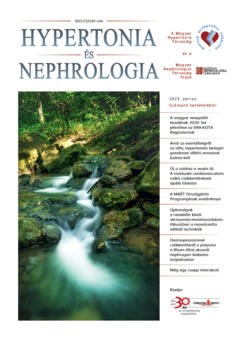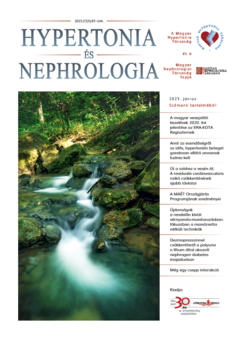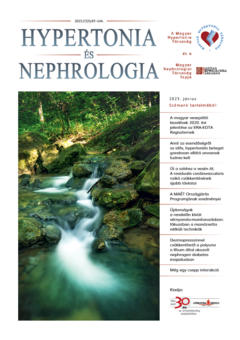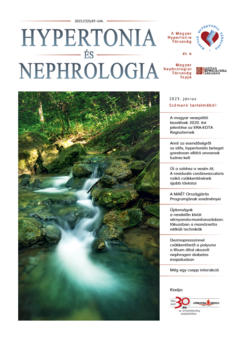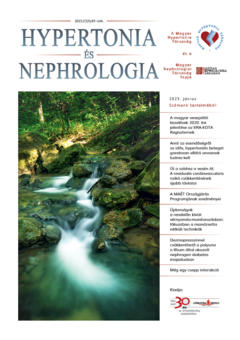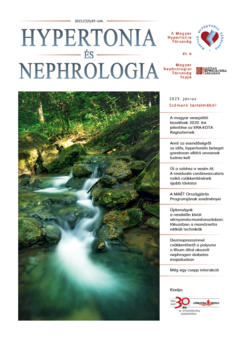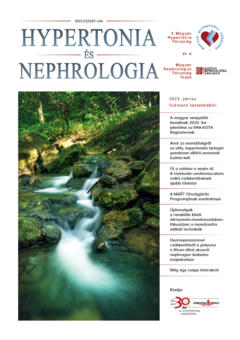The eLitMed.hu medical portal uses computer cookies for convenient operation. Detailed information can be found in the Cookie-policy.
Hypertension and nephrology - 2023;27(03)
Content
[The 2020 annual report of Hungarian kidney replacement therapies to the ERA-EDTA Registry]
[ The authors briefly describe the history of the ERA-EDTA (European Renal Association – European Dialysis and Transplantation Association – today ERA only) Kidney Replacement Therapy – KRT Registry and the history of domestic data collection. After that, the incidence and prevalence of KRT Registry of the ERA after a gap of more than two decades, will be presented. In 2020, the number of day 1 incident CKD patients receiving KRT was 197 per 1 million, while the total number of people living with dialysis and transplanted kidneys (prevalant patient on 31 of Dec) was 998 per 1 million inhabitants. The report was made with aggregated patient numbers. The future plan: transition to the creation of a register according to individual patient data.]
[What the doctor caring for elderly hypertensive patients needs to know about frailty]
[ The frailty syndrome – a highly complex pathological condition intertwined with physiological aging, that leads to the old patient’s co-organizational insufficiency in warding off the increasing internal and external stresses – is gaining more and more emphasis in recent professional papers and treatment guidelines for hypertension of aged patients. This geriatric syndrome requires a high degree of caution and restraint in medical decisions and also on several cardiovascular interventions, such as antihypertensive treatment, and its extent, due to the possibility of harmful adverse therapeutical responses. That threat comes to the fore especially in the second stage of old age (aged over 80 years) as a result of the increasing frequency and severity of frailty. The paper defines frailty, its types/severity, and variants, and presents the simplified or more complex – but also time-consuming – diagnostic procedures, as well as the future promises for early detectability of the frailty risk separatable from signals of aging, even in normal conditions. The aim of the paper to draw the attention of caregivers treating high blood pressure or other cardiovascular conditions in old patients to test more carefully the risk of frailty or its already acting condition and consider its potentially harmful influence for adverse therapeutic responses.]
[The path to the heart through the kidney. New perspectives for reducing residual cardiovascular risk – pathways and mediators of mesodermal cross-talk]
[The continued high morbidity of cardiovascular diseases justifies the exploration of “residual” risk factors. During embryonic development, the cardiovascular organs, bones, muscles, kidney, and adipose tissue differentiate from the mesoderm, the remaining humoral and mechanical communication between cell lines partly explains the phenomenon of residual cardiovascular risk, and partly leads to the delineation of new therapeutic targets. Among the common factors in the pathogenesis of osteoporosis and atherosclerosis, inflammation can be highlighted, which makes the beneficial effects of biological therapy treatment understandable. The Klotho system and the AGE-RAGE axis are responsible for age-related systemic changes. Cardiokines, myokines, osteokines, adipokines, and hepatokines are molecular mediators of complex interactions between individual organs. In particular, the cardio-renoprotective effects of the GLP-1RA and SGLT2i drug classes already used in diabetology are part of the systemic beneficial effect. Similarly, blocking mineralocorticoid receptors with finerenone has a generalized anti-inflammatory, anti-oxidant and anti-fibrotic effects. Regular exercise has always been recommended for cardiovascular patients, but now more and more mechanisms are becoming known that highlight the role of skeletal muscle in regulating the entire metabolism. Simultaneous use with the diet, it can be a simple and effective method to control the progression of cardiovascular disease.]
[Results of the Countrywide Survey Programme of the Hungarian Society of Angiology and Vascular Surgery (MAÉT)]
[The increasing prevalence and consequences of peripheral vascular disease are making it an increasingly important public health concern. Epidemiological data and knowledge about the care of this disease in Hungary and Central and Eastern Europe are scarce. In 2019, the Hungarian Society of Angiology and Vascular Surgery (MAÉT) has announced a Countrywide Survey Programme. One of its objectives was to learn about the regional data on vascular care. The data source for this was the responses to a questionnaire addressed to local representatives of vascular medicine and the results of a research based on the insurance data of the entire Hungarian insured population (HUNVASCDATA study). The present summary presents regional data on several interventions (lower limb amputations and vascular interventions) considered as quality indicators of vascular care, as well as the availability of vascular specialists.]
[Novelties in out-of -office blood pressure monitoring: cuffless techniques in focus]
[Hypertension guidelines recommend using the average values of static blood pressure readings (office or out-of-office), although the dynamic nature of blood pressure is well-known. At current paradigm of hypertension care the awareness and control of hypertension in the population is insufficient. Cuffless blood pressure monitoring has several theoretic adventages. These devices are capable of both intermittent, and continuous long-term blood pressure monitoring, combining the adventages of both home blood pressure monitoring (HBPM) and ambulatory blood pressure monitoring (ABPM) without disturbing everyday activities or sleep. The clinical usefulness of these devices must also be proven in healthy people and those with diagnosed hypertension. If the accuracy standard, which is specific for the validation of these devices has been accepted the cuffless blood pressure monitoring can result a paradigm shift in hypertension awareness and care.]
[Desmopressin may counteract polyuria in lithium-induced nephrogenic diabetes insipidus. Review of the literature]
[Lithium is a simple ion that remains the best, safest and least expensive treatment for the prevention of recurrent episodes of bipolar disorder. However, in many patients administration of lithium is associated with renal side effects. The most frequent side effect is a defect in urinary concentration which may lead to permanent lithium-induced nephrogenic diabetes insipidus. Patients suffer from a disturbed night therefore it is an eminent goal to secure them some rest. In our previous work administration of excessive doses of desmopressin resulted in clinically relevant antidiuresis in lithium-induced nephrogenic insipidus enhanced by indomethacine The purpose of the present paper is to review the literature concerning the use of desmopressin in lithium-induced nephrogenic diabetes insipidus.]
[One more drop of interaction]
[The composition of hypertensive patients’ therapy requires particular attention. Beside the classification of hypertension, the co-morbidities and the complications, the interactions between the simultaneously applied medications and medical products should be considered. In the publication the authors present a patient, who became normotensive after a successful therapy optimalization at the hypertension outpatient clinic, and then after a few month applied for check-up due to dizziness caused by hypotensive episodes and diarrhoea. In connection with this the interaction of the cannabidiol, the active compound of cannabis oil, which was taken by the patient, came to light, as well as the side effects in connection with the antihypertensive, antidiabetic, and gastric acid secretion inhibitor drugs. The authors draw attention to the fact that the dietary supplements taken by the patients are not always harmless, and in case of sudden onset, inexplicable complaints, drug interaction should be investigated in the background. In the publication, an overview of the most important knowledge for the practicing physician is provided about the mechanism of action, possible side effects and drug interactions of the cannabidiol containing dietary supplement.]
1.
Clinical Neuroscience
Is there any difference in mortality rates of atrial fibrillation detected before or after ischemic stroke?2.
Clinical Neuroscience
Factors influencing the level of stigma in Parkinson’s disease in western Turkey3.
Clinical Neuroscience
Neuropathic pain and mood disorders in earthquake survivors with peripheral nerve injuries4.
Journal of Nursing Theory and Practice
[Correlations of Sarcopenia, Frailty, Falls and Social Isolation – A Literature Review in the Light of Swedish Statistics]5.
Clinical Neuroscience
[Comparison of pain intensity measurements among patients with low-back pain]1.
Clinical Neuroscience Proceedings
[A Magyar Stroke Társaság XVIII. Kongresszusa és a Magyar Neuroszonológiai Társaság XV. Konferenciája. Absztraktfüzet]2.
3.
Journal of Nursing Theory and Practice
[A selection of the entries submitted to the literary contest "Honorable mission: the joys and challenges of our profession" ]4.
Journal of Nursing Theory and Practice
[End of Life and Palliative Care of Newborns in the Nursing Context]5.
Journal of Nursing Theory and Practice
[Aspects of Occupational Health Nursing for Incurable Patients ]